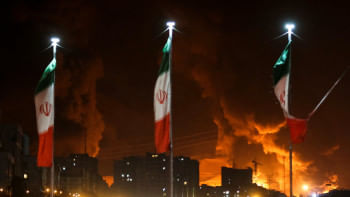Diplomatic merchandise: Exploiting the issue of Palestinian recognition

They have been the playthings of powers for decades, and there is no promise that this will end soon. Empires and powers seem to come and go, yet the plight of the Palestinians remains more horrific than ever. Now, in the next instalment of the grand morality game, France, the UK, and Canada promise to recognise Palestinian statehood at the September meeting of the 80th session of the United Nations General Assembly.
From the perspective of soothing the conscience, this is a mighty thing—for those in Paris, London, and Ottawa. It does not save a single life on the ground in Gaza or the West Bank, provide a single meal for a starving family, or rebuild a single destroyed school. But President Emmanuel Macron and Prime Ministers Sir Keir Starmer and Mark Carney can all commune as a triumvirate of principled statesmen.
Macron, the first of the three, made signals on the issue earlier in the year. The French leader had hoped that a UN conference sponsored by France and Saudi Arabia would be the venue for joint recognition, but it came to naught with the resumption of hostilities in Gaza and Israel's attacks on Iran's nuclear facilities. In turning to the G7 nations, he hoped to amplify the urgency of recognition.
In doing so, the onus was also on the Palestinian Authority (PA) to make certain concessions to add momentum. A letter from PA President Mahmoud Abbas sent to Macron duly came, condemning the attacks of October 7, 2023 by Hamas, demanding the immediate release of all hostages, and making the pledge to hold elections and introduce reforms to governance. Hamas—not that Abbas had any claims on this point—would also "no longer rule Gaza" and would have to surrender "weapons and military capabilities to the Palestinian Security Forces, which will oversee their removal outside the occupied Palestinian territory, with Arab and international support."
On July 24, Macron confirmed in a letter to Abbas, conveyed via France's consul general in Jerusalem, that recognition of a Palestinian state would follow in September "in light of the historic commitments that were made" and the threatened two-state solution. On July 28, in his opening speech to a plenary session of the High-Level International Conference on the Peaceful Settlement on the Question of Palestine and the Implementation of the Two-State Solution, France's Minister for Europe and Foreign Affairs Jean-Nöel Barrot stated the "prospect of two states, whose rights are recognised and respected, is in mortal danger." But assurances and momentum had been achieved, with Barrot acknowledging the condemnation by the Arab League of the Hamas attack and the insistence by its members on the release of the remaining hostages, the disarming of the group and conclusion of its rule in the strip.
Of the G7, Starmer was the next to be swayed, but with a notable proviso, "The UK will recognise the state of Palestine by the United Nations General Assembly in September unless the Israeli government takes substantive steps to end the appalling situation in Gaza, agree to a ceasefire, and commit to a long-term sustainable peace, reviving the prospect of a two-state solution." To this could be added the need for Hamas to release the hostages, accept a ceasefire, disarm and "play no part in the government of Gaza." In a shabby fashion, room is left to withdraw the offer for recognising Palestinian statehood. "We will make an assessment in September on how far the parties have met these steps."
Carney, the latest addition, claimed on July 30 that the two-state solution growing from a negotiated settlement between Israel and the Palestinian Authority had been eroded as a prospect by four factors: the threat of Hamas to Israel; accelerated building across the West Bank and East Jerusalem, including numerous instances of Israeli settler violence; the E1 Settlement Plan and the July vote by the Knesset calling for the annexation of the West Bank; and the ongoing failure by the Israeli government to arrest "the rapidly deteriorating humanitarian disaster in Gaza, with impeded access to food and other essential humanitarian supplies."
The Canadian PM, in reasons almost identical to Macron, was also swayed by "the Palestinian Authority's commitment to much-needed reforms" in governance, including the promise to hold elections in 2026 that will exclude Hamas, undertaking anti-corruption measures, and the creation of a demilitarised Palestinian state.
A resounding theme comes through in the latest flurry of statements: Palestinians continue to be lectured and harangued under the guise of humanitarian understanding, told who can represent them or not (a reformed Palestinian Authority promisingly good, Hamas decidedly bad), and whether they can have any semblance of a military force. "Recognising a State of Palestine today," states Barrot, "means standing with the Palestinians who have chosen non-violence, who have renounced terrorism, and are prepared to recognise Israel." Standing, it would seem, with a certain type of idealised Palestinian.
The Palestinians have become diplomatic merchandise or bits of currency, to be gambled with in the casino of power politics. Starmer is the worst exponent of this, hoping for such returns as Israel's halt to the slaughter and famine in Gaza as well as the release of the hostages by Hamas and its disarmament. But the idea of Palestinian recognition remains, at this stage, a moot point.
At the end of any diplomatic tunnel on this lies certain requirements that would have to be met, not least the criteria of the Montevideo Convention from 1933. Despite gathering some dust over time, it outlines the relevant requirements for statehood: any recognised state in international law must have a permanent population, a defined territory, a discernible government, and the capacity to enter into relations with other states. In the UK, some 43 cross-party peers have sent a letter of warning to Starmer arguing against recognising a Palestinian state, citing such familiar, legal grumbles. There was, for instance, "no certainty over the borders of Palestine" nor "a functioning single government, Fatah and Hamas being enemies." Neither could enter into relations with foreign states, with one entity having not held elections for decades, and the other being a "terrorist organisation." Despite the UK not signing the Montevideo Convention, recognising Palestine "would be contrary to the principles of governing recognition of states in international law," the convention having become part of international customary law.
On the bloodied ground, where legal abstractions dissolve into fleshy realities, Israel is doing its level best to make sure that there will be nothing left of a Palestinian state to recognise. For Israel, the case is not one of if or when, but never. The machinery of slaughter, deprivation and dislocation is now so advanced, it risks smothering the very idea of a viable Palestinian entity. The Israeli policy till October 2023 was engineered to stifle and restrain any credible progress towards a Palestinian state, crowned by feeding the acrimonious divisions between Hamas and Fatah. After October 7 that year, the sharpened focus became one of expulsion, subjugation or plain elimination of the general populace. Palestinian sovereignty remains, to date, incipient, a bare semblance of a political self. This egregious state of affairs continues to be supported, even by those wishing to recognise Palestine. In some ways, those sorts are arguably the worst.
This article first appeared on the Concurrents.org and the Middle East Monitor on August 2, 2025.
Dr Binoy Kampmark was a Commonwealth scholar at Selwyn College, Cambridge. He is a senior lecturer at RMIT University, Australia. He can be reached at [email protected].
Views expressed in this article are the author's own.
Follow The Daily Star Opinion on Facebook for the latest opinions, commentaries and analyses by experts and professionals. To contribute your article or letter to The Daily Star Opinion, see our guidelines for submission.

 For all latest news, follow The Daily Star's Google News channel.
For all latest news, follow The Daily Star's Google News channel. 











Comments